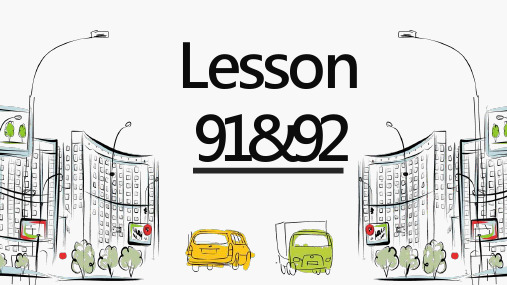新概念第一册Lesson-91-92课件 (共35张PPT)
新概念英语一册课后练习答案(Lessons91-92)

【导语】新概念英语作为家喻户晓的经典之作,它有着全新的教学理念,有趣的课⽂内容及其全⾯的技能训练,为⼴⼤的英语学习者提供帮助!如果你也想学好英语,⼜怎能错过新概念英语?下⾯为您提供了相关内容,希望对您有所帮助! 新概念英语第⼀册91-92课词汇学习 Word study miss v. (1)想念,惦念: We'll miss you. 我们会想念你的。
His mother misses him very much. 他母亲很惦念他。
(2)错过;未做到: He overslept and missed his train. 他睡过了头,错过了他那班⽕车。
I missed an opportunity of realizing my dream. 我错过了⼀个可能实现⾃⼰梦想的机会。
still adv. (1)还是,仍然: I still don't understand what he meant. 我还是不明⽩他是什么意思。
She was still beautiful at the age of 46. 她46岁时依然美丽。
(2)还要,甚⾄更: It was hot yesterday, but it's still hotter today. 昨天很热,然⽽今天甚⾄还要热些。
She looked very ill last week and this week looks still worse. 上星期她看上去病得很厉害,⽽这个星期看来更不⾏了。
(3)静⽌地;安静地: He is sitting still. 他⼀动不动地坐着。
The patient is lying still. 病⼈安静地躺着。
新概念英语第⼀册92课课后练习答案 Key to written exercises Lesson 92 A 1 He'll arrive tomorrow morning. 2 She'll come this evening. 3 It'll snow tonight. 4 He'll not believe me. B 1 Yes, and it will snow tomorrow, too. 2 Yes, and he will get up late tomorrow, too. 3 Yes, and he will arrive late tomorrow, too. 4 Yes, and he will finish work late tomorrow, too. 5 Yes, and she will drive to London tomorrow, too. 6 Yes, and she will telephone him tomorrow, too. 7 Yes, and he will have a shave tomorrow, too. 8 Yes, and she will sweep the floor tomorrow, too.。
新概念第一册L91-92课ppt课件

in person 亲自,直接的 Eg: He gets the money in person.
他亲自去取钱。
personal adj. 个人的,私人的 Eg:a personal letter
★ people
n. ①人们 Eg:There are a lot of people in the street. 街上有很多人。
一般将来时练习题
( ) 1. There ____C______ a meeting tomorrow afternoon.
A. will be going to
B. will going to be
C. is going to be
D. will go to be
( ) 2. Charlie ___D_____ here next month.
house yet?
副词still也可用于一般现在时, 注意位置在be动词之后。
JENNY: No, not yet. He’s still here.
He’s going to move tommorrow.
最新编辑ppt
24
CATHERINE: When? Tomorrow morning?
JENNY: No. Tomorrow afternoon.
• A.don't feel B.hasn't felt
• C.haven't felt D.didn't feel
最新编辑ppt
7
• Mr smith _______to Tokyo and he will be back in a week
• A.has been B.has visited • C.has sent D.has gone
新概念英语第一册第91-92课ppt课件

6
★neighbour
n. 邻居
neighbourhood
n.四邻,邻近地区
这一带很安静。
This is a quiet neighbourhood.
他要搬到这一带。
He is moving into the neighbourhood.
in the neighbourhood of
10
rain snow leave get up arrive finish work have a holiday drive home
have a haircut telephone me have a shave pack his bags sweep the floor paint this room repair my car
He’s still here.
将来时的时间状语
He’s going to move tomorrow.
be going to 打算做某事
25
将来时的时间状语
CATHERING: When? Tomorrow morning?
JENNY:
No. Tomorrow afternoon.
I'll miss him. 思念,想念 错过
make an appointment
11
02
Practice
12
• still • move • miss • neighbour • person • people • poor
v. 想念,思念 n. 邻居 adv. 还,仍旧 v. 搬家 n. 人 adj. 可怜的 n. 人们
13
03
Game Time
新概念英语第一册lesson91-92学习资料

Grammar
一般将来时 (the future tense)
1.一般将来时表示在将来某一时间将要发生 的动作或存在的状态,也可表示将来某一 段时间内经常发生的动作或存在的状态。
2.结构: Shall (第一人称I we ) /will+动词原形
be going to +动词原形
与一般将来时连用的时间状语
adv. 还,仍旧 v. 搬家 v. 想念,思念 n. 邻居 n. 人 n. 人们 adj. 可怜的
already用于陈述句和肯定句句中
A :Has Ian sold his house yet? yet用于疑问句和否定句的句尾。
B: Yes, he has. He sold it last week. A: Has he moved to his new house yet?
按照中文习惯去赞同别人的说法,而是要根据 事实来说,因此回答no, he didn’t want to leave. 但是翻译成中文的时候要说,是的,他 不愿意离开。 反意疑问句,前肯后否,前否后肯。 例句: He didn’t go to school last week, did he?
No, he didn’t. 是的,他没去。 Yes, he did. 不,他去了的。
B: No, not yet. He’s still here. He’s going to move tomorrow.
A: When? Tomorrow morning?
B: No. Tomorrow afternoon. I’ll miss him. He has always been a good neighbour .
A:I think that they will move in the day after
新概念英语第一册91-92课-完整ppt

OK,has Ian sold his house?Maybe yes,maybe no,has he moved to a new house? Now let`s listen to the audio and see if you can answer the question"Who wanted to sell the house?"
Lesson 91Poo源自 Ian本课内容• 单词学习 • 课文讲解 • 练习 • 日常用语 • 作业
Episode
If your father wants to go to the cinema,your mother wants to go shopping,what will they do?
• ★person n.(强调个体,不分男女老少,有复数persons) • The person in a hat is my father.
• ★people n.(强调集体,是集合名词) • How many people are there in your family? • person • n. 人
• He is sitting still. • 他一动不动地坐着。 • 病人安静地躺着。
• The patient is lying still.
• ★move v. 搬家;感动 • 这个故事感动了我。
• This story moves me. • move to 搬到……地方 • move in 搬进 • move out 搬出来 • move away 搬走 • 我们下个月将搬到乡下
新概念英语NCE_Lesson91-92(共46页)课件

because 因为
• because of 由于、、、因为、、、 的缘故,与because 不同,后面不 跟从句。
➢ I want to be bed early because I was tired.
➢ I was late because of the rain.
★retire • ① v. 退休;离职 • 不久他将退休,结束其航海生涯。
Ian: Women always have the last word.
课文讲解
• I believe that this house is for sale. • for sale 供出售,有待出售。 • on sale 减价出售。
• May I have a look at it? • have a look at = look at 看一看 • 我想看一下那张地图。
• I want to have a look at that map. • 正式提出请求:May I...? • 我能进来吗?
• May I come in? • 较为随意的请求方法:Can I...? • Can I come in?
• -How long have you lived here?
• He’s going to retire soon from the sea. • ② v. 退出;退隐 • 他周末通常退隐到他那个乡间别墅生活
• He often retires to his country house at weekends.
• 女士们离席退出,先生们则继续喝酒聊天。
• The ladies retired, and the gentlemen went on drinking and chatting.
新概念英语第一册ppt课件91课

★move v. 搬家;感动 The story moves me. move to 搬到……地方 move in 搬进 move out 搬出来 move away 搬走 move into 搬进(由外到内的过程)
★miss v. 想念,思念 ① v. 想念,惦念 ② v. 错过;未做到 He overslept and missed his train. 他 睡过了头,错过了他那班火车。 I missed an opportunity of realizing my dream. 我错过了一个可能实现自己梦想的机会。
1. I _____ country?
leave)in a minute.
2. -How long _____ you _____(study)in our
3. I ______(be)tired. I ______(go)to bed early
tonight. 4. Mary's birthday is next Monday, her mother _____ (give)her a present. 5. It is very cold these days. It ______(snow)soon.
常用信号词:next Tuesday next week the coming Sunday next year this afternoon
tomorrow tonight in a few minutes in the future in five years
一般将来时
概念:打算或将来要发生(做)的事情 结构: 肯定句:S+ will +V原+其他 。 否定句:S+ won’t +V原+其他。 疑问句:Will +S +V原+其他 ? 回 答:Yes, S +will./No, S +won’t. 注:第一人称 I/we shall +V原 shall not =shan’t will除表示纯粹的将来时间外,还表示说话人的 意图和意愿,而shall除了表示将来时间外同时 还表示说话人的责任或决心
新概念英语第一册ppt课件91课(推荐完整)

一般将来时
will+动词原形=be (am/is/are) going to+动词原形
区别;1. will表示没有事先考虑过的意图。 be going to则是 指事先考虑过的意图。
例如; --- It's heavy. ---- I will help you . Tomorrm is Sunday, I am going to have a rest.
2.will 表示说话人认为、相信、希望或嘉定要发生的事,不 含任何具体时间,可以指遥远的将来;而be going to指有 迹象表明某事即将发生或肯定发生,通常指很快就发生的事。 例如: He will get better.
Look at the clouds, it's going to rain.
I missed an opportunity of realizing my
dream. 我错过了一个可能实现自己梦想的机会。
★people n. 人们 集合名词 表示民族时 可加s ten people 十个人 56 peoples 56个民族
the peoples of China and USA (指两国人民,用复数形式)
1. I _____ leave)in a minute. 2. -How long _____ you _____(study)in our country? 3. I ______(be)tired. I ______(go)to bed early tonight. 4. Mary's birthday is next Monday, her mother _____ (give)her a present. 5. It is very cold these days. It ______(snow)soon.
- 1、下载文档前请自行甄别文档内容的完整性,平台不提供额外的编辑、内容补充、找答案等附加服务。
- 2、"仅部分预览"的文档,不可在线预览部分如存在完整性等问题,可反馈申请退款(可完整预览的文档不适用该条件!)。
- 3、如文档侵犯您的权益,请联系客服反馈,我们会尽快为您处理(人工客服工作时间:9:00-18:30)。
课文理解:
CATHERING: Has he moved to his new house yet?
2018/12/22
move v. ② 移动
eg. Don't move.别动。 The teacher moved to the front of the classroom. 老师走到了教室的前面。 They move the desks to the left of the room. 他们把课桌移到了房间的左边。
2018/12/22
Poor Ian.mp3
第一遍 听文章大意~ 第二遍 听力填空~
2018/12/22
Lesson91— —92.flv
2018/12/22
第三遍 听课文、回答问题
1 Has Ian sold his house yet? 2 Has he moved to his new house yet? 3 When is he going to move?
2018/12/22
miss v. 想念,思念
1)想念,思念 eg. We will miss you if you move. 如果你搬家了,我们会想你的。 I really miss my hometown. 我真的很想念我的家乡。 2)错过 We missed the bus. 我们错过了那辆公车。
2018/12/22
If you persist, you will become a superman
2018/12/22
12个单元 长元 音 音 元 音 8个双元 音 短元 音
[ai]
[a:] [Λ] [ei] [t]
[ә:] [ә] [ɔi] [k]
[i:] [i]
[ɔ:] [ɔ]
[u:] [u] [æ ] [e] [әu] [tr] [θ] [ t s ] [ d z ]
2018/12/22
neighbour n. 邻居
eg. He and I are neighbours. 他和我是邻居。 neighbourhood 四邻,邻近地区 eg. This is a quiet neighbourhood. 这一带很安静。
2018/12/22
person n. 人 people n. 人们
4 Is he a very nice person?
2018/12/22
第三遍 听课文、回答问题
1 Has Ian sold his house yet? Yes, he has. He sold it last week. 2 Has he moved to his new house yet? No, he hasn't. 3 When is he going to move? He is going to move tomorrow. afternoon. 4 Is he a very nice person? Yes, he is.
2018/12/22
• What shall I do
2018/12/22
原形:sell 过去 现在完成时的标志词 sold CATHERING: Has 式: Ian sold his house yet? JENNY: Yes, he has. He sold it last week. 表示过去的时间状语
2018/12/22
• :语法和阅读。建议大家进行课后的习题练习和同步测试,
巩固学习内容,检验学习效果。 • :
• 坚持记单词,完成作业。你可以在接触一篇新的课文前,先 不要看它的英文,而是根据它的中文翻译自己写再翻译成英 语,然后再和原文对照,这样一经对比,就可以找到自己写 作的弱点和问题,及时修正,日久积累,从而获得提高。。
eg. He is a good person. 他是个好人。 There are a lot of people in the street. 街上有很多人。 person单数,people是复数(不加S)
2018/12/22
poor adj. 可怜的
1)可怜的, eg. The poor old woman had no one to talk to. 那个可怜的老妇人找不到人和他说话。 2)贫穷的, ↔ rich eg. We must help the poor people. 我们要帮助穷人。
2018/12/22
• 坚持每周听课文 • 第一步:不要看书,将整篇课文听写下来。。 • 第二步:把听写下来的文章与原文比对,查找错 误,知道自己错在哪,以后今后如何避免。 • 第三步:跟着磁带反复跟读课文。 • : • 背诵,背诵一些经典课文将对英语的记忆、理解 非常有益。尤其对于英语初学者而言,通过背诵 课文可以加深对英语的记忆,坚持在课堂上踊跃 回答问题,争取每一个能够说英语的机会练习。
[iә ] [eә ] [f] [s]
[uә ] [au] [∫] [t∫]
清辅 [p] 音 10 对 浊辅 [b] 音 3个鼻音 3个似拼音
2018/12/22
[d]
[g]
[v]
[z]
[3]
[d3]
[dr] [ð ]
辅 音
[m] [h] [w]
[n] [r] [j]
[η] [l]
2个半元音
still [stɪl] adv.还,仍旧 v. 想念,思念 neighbour [nebɚ] n. 邻居 person ['pɜ:rsn] n. 人 people ['pi:pl] n. 人们 poor [pʊr] adj. 可怜的
2018/12/22
still adv.还,仍旧
eg.I still want that toy! 我还是很想要那个玩具。 She was still beautifull at the age of 50. 她50岁时依然美丽。
2018/12/22
move v. ① 搬家
move from...to...从...搬到... eg. They moved from Nanjing to Shenzhen. 他们从南京搬到了深圳。 We are going to move to a house in the country. 我们将要搬到乡下的房子里去。
